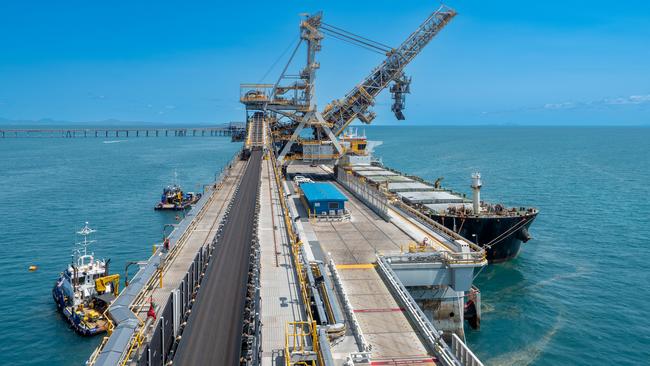Coal giant warns of return to strikes and lockout in sector
Coal giant BHP Mitsubishi Alliance (BMA) has warned Australia risks returning to an era of lockouts and strikes under Labor’s controversial industrial relations reforms.

The boss of coal giant BHP Mitsubishi Alliance has warned of a return to an era of lockouts and strikes under Labor’s controversial industrial relations reforms.
BMA asset president Adam Lancey told the Queensland Resources Media Club on Tuesday that the laws would have an impact on costs and “productivity needed to stay as part of that conversation”.
Employers including BHP have accused unions of a productivity-sapping power grab after they capitalised on the federal government’s workplace laws to force BHP to start negotiating the first union collective agreement in the Pilbara for almost a decade.
“We don’t want to see the Pilbara return to the era of lockouts and strikes and impacts to production levels, which can jeopardise the viability and the benefits that we get from those operations,” Mr Lancey said. “Competitiveness is something that we should all be focused on. We’ve got some great strengths here in this country and we are blessed with resources that the world needs. We need to make sure that we’re encouraging and supporting the industry to be prosperous, not trying to make it harder to do business in Australia.”
Unions will push for hundreds of workers at BHP’s iron ore mines in the Pilbara to get guaranteed annual 5 per cent wage rises, higher wages for long-serving tradesmen and improved rosters. The Minerals Councils of Australia has accused unions of exploiting a “deliberate loophole” in Labor’s laws where unions no longer have to demonstrate majority support of workers to force bargaining but can do it within five years of an agreement expiring. The last collective agreement expired in August 2019.
Mr Lancey also took aim at Queensland government policies, including a hike in coal royalties and regulatory red tape, that were making it difficult to attract the required investment in the state’s world-quality coking coal reserves.
He said that the sector needed policy and fiscal settings that gave the state a competitive edge and an industrial relations system that delivered “productivity, flexibility and competitiveness”.
BMA, a joint venture between BHP and Mitsubishi Development, operates five coal mines in the Bowen Basin, as well as owning and operating the Hay Point Coal Terminal near Mackay.

While the industry is positioned to grow, it must have a government that could “deliver stable policies and fiscal settings, practical approval frameworks and trading arrangements to attract the investment needed to produce the resources”, Mr Lancey said.
“Where governments act unpredictably and unreasonably, they increase risk for investment,” he said. “We’ve seen this in Queensland, which have generated significant concerns, particularly on how little engagement there was on such important decisions.”
Labor is under fire in Queensland for hiking coal royalties without consulting the sector, while at the federal level, the Albanese government’s reforms to industrial relations, including a crackdown on labour hire, has been attacked for raising costs and reducing flexibility.
Mr Lancey said improved dialogue with the government would allow the sector to mitigate the negative impact of shortsighted policy decisions that might deliver an immediate sugar hit – to the detriment of investment and future generations of Queenslanders.
“That’s exactly what we’re asking for from the government of the day,” said Mr Lancey. “We’re asking to come back to the table and create a shared vision on how Queensland can capitalise on the great assets, people and future of the resources sector.”
Roughly 40 per cent of global steelmaking coal exports come from Queensland, with the resource essential to meet growing demand driven by markets like India and Southeast Asia.
“While China alone has recorded a fifth consecutive year of crude steel production of above one billion tonnes, we know we’re entering an era of adjustment with China’s steel production plateauing,” Mr Lancey said. “Crude steel production in India, however, has increased by over 40 per cent since the beginning of the decade. (It’s) now touted as the fastest-growing major economy and looking to likely make up for a proportion of China’s post-plateau era.”
Mr Lancey said that when the NSW government proposed its own changes to coal royalty rates, it “took the time to engage with industry and sought to understand the impact these changes would have”. “Being on the ground with the NSW team, I was part of these discussions where the engagement was respectful, with a focus on understanding, collaboration and delivering a mutually beneficial outcome,” Mr Lancey said.
“Working together, we struck a balance between public needs and what was required to keep industry and NSW competitive.”

By contrast, in Queensland an additional $9.4bn has been collected from the coal industry over the past two years without discussion or consultation.
The Queensland mining industry contributed more than $116bn to the state economy and made more than $18bn in payments to the state government, including in royalties.
“The industry numbers reported today are the result of investment decisions made under very different circumstances in Queensland,” he said.
“How long Queensland will enjoy the legacy of decisions made when fiscal settings were different remains to be seen, but responsible planning means making decisions today that will benefit for the future.”
More Coverage
Originally published as Coal giant warns of return to strikes and lockout in sector





